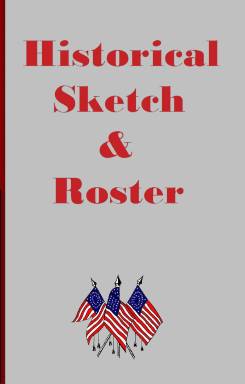14th Iowa Volunteer Infantry Regiment
 HISTORICAL NOTES:
HISTORICAL NOTES:
This regiment was organized in the fall of 1861, at Camp McClellan, near Davenport. The circumstances surrounding the regiment's organization and history were somewhat peculiar. Three companies, A, B, and C, were sent to the western frontier on special service and were not identified with the regiment at any time, except technically, never being under command of an officer of the regiment. They were located at Fort Randall, Dak., and were afterwards ordered detached from the regiment. They constituted the 1st battalion of the 41st regiment for a time, but the formation of that regiment was not completed and they were finally made part of a cavalry regiment. The 14th thus went into service with but seven companies and remained at that strength for the first year, the number aggregating something over 600 when it left for St. Louis on Nov. 28. It remained at Benton barracks until Feb. 5, 1862, when it moved to Fort Henry, thence to Fort Donelson and was a part of the brigade under Gen. Lauman. Three weeks later it proceeded to Pittsburg landing and in the battle of Shiloh formed a part of that famous brigade, composed of the 2nd, 7th, 12th and 14th Ia., which fought from morning until dark of the first day against ten times its numbers, allowing the army to retire and take up new position, and at last, cut off and surrounded, gave up the unequal contest and surrendered to the enemy, many of them to be shot down without mercy after they had given themselves up as prisoners of war. The account of their imprisonment and eventual parole and exchange is given in the history of the 8th Ia. The few who escaped capture became a part of the "Union Brigade" and joined their comrades at Benton barracks, where the regiment spent the winter. It was also joined by Cos. A and B, two new companies raised to take the place of those sent west, and many recruits. Capt. Joseph Newbold was commissioned lieutenant-colonel and Capt. Edgar Warner was made major. On April, 10, 1863, it moved to Cairo, where it was joined by a newly organized Co. C, completing its numbers. While at Cairo, part of the regiment was sent into the interior of Illinois to quell some political disturbances and arrest the ringleaders who were inciting treason. Moving to Columbus, Ky., the latter part of June, it remained on garrison duty for seven months. It embarked for Vicksburg on Jan. 14, 1864, and was there assigned to the 2nd brigade, 3d division, 16th army corps, Col. Shaw commanding the brigade, and Lieut. -Col. Newbold, the regiment. After the Meridian raid it accompanied the Red River expedition with Gen. A. J. Smith's command; was engaged at Fort DeRussy, which was taken by storm in less than 30 minutes; and then joined Banks just in time to save his army, by its determined fighting at Pleasant Hill. The regiment was engaged at Cloutierville, Moore's plantation, Marksville and Yellow bayou, crossed the river to Morganza and returned to Vicksburg. It was in the affair at Lake Chicot; then moved to Memphis; took part in the battle of Tupelo; fought at Old Town creek soon after; went to camp at Memphis and enjoyed a brief rest, broken by a trip to Oxford, in which several skirmishes occurred. It was then ordered to Cairo, thence to Jefferson barracks, where four companies were detached and sent to reinforce Gen. Ewing at Pilot Knob. The day after their arrival Ewing was attacked by a largely superior force, but the enemy was repelled several times with heavy loss. On the following day a direct assault was repulsed, but guns planted on a hill near by compelled the Union forces to evacuate the place, after blowing up the fort. The little command retreated to Rolla after cutting its way through the enemy's lines and fought every foot of the way for four days with scarcely an hour's rest. The remainder of the regiment marched across Missouri in pursuit of Price. It was reunited at St. Louis in November, and proceeded to Davenport where it was mustered out Nov. 16, 1864. The recruits and reenlisted men were formed into a battalion of two companies, of which Capt. Hugo Hoffbauer had command. It remained on provost guard duty until the summer of 1865, detachments being used for escort and prisoners' guards at various times, and was mustered out in Aug., 1865. One thing which contributed to the feeling of dissatisfaction with many was the dismissal of Col. Shaw on the charge of violating regulations in regard to a publication over his own signature of things relating to the operation of the armies. His offense consisted of having written a private letter, which got into print through the indiscretion of a friend, in which Shaw told the facts with regard to the fight at Pleasant Hill, during the disastrous Red River expedition. His force of less than one-tenth of those present suffered one-half of the loss sustained by the entire force, having been engaged over 7 hours, or fully four times as long as any other on the field, repulsing a cavalry attack and a succeeding infantry attack before a gun was fired by any other troops. He named several officers as having been intoxicated and cowardly in that affair. When the order for dismissal came to Gen. A. J. Smith, commanding the corps, he refused to have it promulgated, but relieved Col. Shaw from the command of the division, and allowed him to proceed to Davenport and be honorably mustered out with the regiment of which he was still colonel, commending him in the highest terms in orders. The officers of the division presented him with a handsome sword and parted from him with regret as he had proved himself one of the best officers that the west had produced.
 OFFICERS:
OFFICERS:
Col., William T. Shaw; Lieut. -Cols., Edward W. Lucas, Joseph H. Newbold; Majs., Hiram Leonard, William H. Kirkwood, Edgar A. Warner.
 ROSTERS:
ROSTERS:
Company A - enrolled in Scott County
Company B
Company C
Company D - enrolled in Henry County, Lee County, Van Buren County &c.
Company E - enrolled in Jasper County &c.
Company F - enrolled in Henry County
Company G - enrolled in Tama County
Company H - enrolled in Jones County
Company I - enrolled in Henry County
Company K - enrolled in Des Moines County
 BIBLIOGRAPHY:
BIBLIOGRAPHY:
 REFERENCES:
REFERENCES:
REF: Dyer, Frederick H., A Compendium of the War of the Rebellion
"The Union Army" by Federal Publishing Company, 1908 - Volume 4








